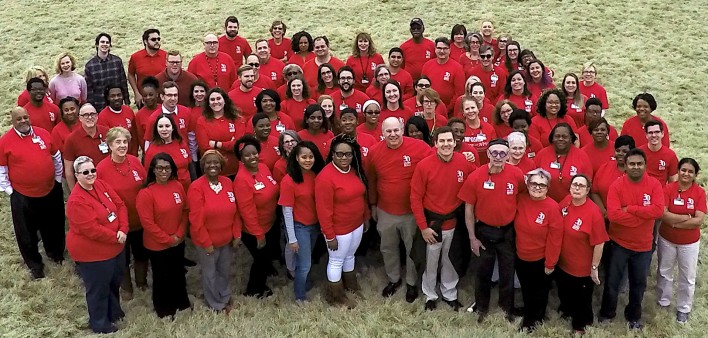In 1988, when Michael Saag, MD, opened an AIDS clinic in Alabama, the virus was considered a fatal disease and many of his clients required anonymity because of stigma. Fast-forward 30 years, and the 1917 Clinic continues to thrive—as do the many people who seek care at the facility.
“What was once a death sentence when we opened the clinic is now a manageable chronic disease,” Saag said in a press release announcing the clinic’s milestone. “The strides that have been made in 30 years from an awareness standpoint, in treatment and therapy available—even bipartisan federal recognition and funding through the Ryan White Care Act—have drastically changed the trajectory of this disease and how people living with HIV can lead their lives.”
Affiliated with the University of Alabama at Birmingham (UAB) Center for AIDS Research, where Saag is a professor of medicine, the 1917 Clinic gets its name from its address: 1917 Fifth Avenue South. Today, the clinic boasts a staff of more than 150 and offers an array of services, including dental and psychiatric care and HIV prevention. What’s more, the facility received funding from the National Institutes of Health.

Milestones of the 1917 Clinic in Birmingham, AlabamaCourtesy of UAB
“What many people may not realize is that our clinic has provided a continuum of care throughout the patient’s life,” said clinic director James Raper, PhD, CRNP, in the press release. “As our patients age with the disease, our therapies shift, and we continue to determine the best treatment possible for that specific person in regard to their entire health. We are still seeing patients who first came to the clinic in 1988 and know that, as we continue to inch closer to a cure, our clinic will continue to evolve to fit the needs of our patients.”
In 2014, Saag published a memoir, titled Positive: One Doctor’s Personal Encounters With Death, Life, and the US Healthcare System. In a POZ interview at the time, Saag spoke about what he considers the biggest challenge people living with HIV face today:
At the top of the list is stigma. Most is what I call internalized stigma. There’s a feeling among people who are infected that they somehow have done something wrong or that they’re getting what they deserve. Or they feel ashamed. And that affects health care. They hide medicines or don’t want to take it if somebody’s around. If you contrast that with someone, say, who is diagnosed with lung cancer—they announce it to the world, and they get support—that underscores that struggle that folks have.
Regarding the epidemic in Alabama today, Raper offers some context. “Currently in Alabama, roughly 14,000 people are living with HIV,” he said in the press release. “Of that number, 10,000 to 12,000 are engaged in care, with 3,500 or so seeking care at the 1917 Clinic. There are also 40 percent of people living with HIV/AIDS in our state who are not engaged in care and do not have symptoms currently, and we must help them understand how to manage the disease, as 70 percent of new infections come from that population.”
Part of the clinic’s focus is reaching the African-American population, which is disproportionately affected by the epidemic.







Comments
Comments